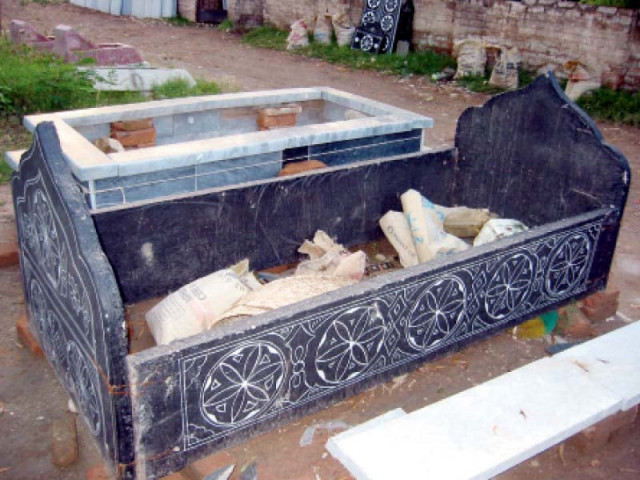From dust to dust: The life and times of Peshawar’s gravediggers
In 20 years, Rehman Baba cemetery has halved in size due to encroachment.

A ready-made concrete structure of a grave. PHOTO: RIAZ AHMED/EXPRESS
Every week, over 80 bodies are laid to rest in the Rehman Baba graveyard of Peshawar. The laborious task of digging through the heart of the earth is overseen by the sons of Muhammad Akram and Juma Khan, the oldest contractors of the cemetery who themselves now rest in peace.
Akram’s four sons adopted their father’s profession. They not only offer digging services, but also provide tombstones, labourers and masons for preparing the burying places. Akram’s son Muhammad Shoaib said the cemetery is considered the largest in the area. “It is second only to the Charsadda graveyard in size,” he maintained.
A mud grave sealed with slabs of stone and cement roughly costs around Rs5,000. Ready-made concrete-structures, that withstand rain and theft, are laid on top for an additional sum of Rs7,000. Prices are inflating with each passing day, and the final cost can go up to Rs25,000. Based on materialistic preferences, even the final abode has a range of types to choose from. “Graves made with bricks are more durable but people prefer the concrete structures to save time,” he said.
Whenever Shoaib and Co receive an order at the shack they call office, labourers are hired to work for them. Muhammad Imran, 24, is one of those daily wagers. “It takes about two and a half hours for two labourers to dig up a six-foot deep grave,” he said, adding a worker can prepare a maximum of two graves per day. “We are paid Rs600 for the task,” he said. Specialised labourers also prepare marble tombstones that are inscribed with names of the deceased, prayers and even a couplet or two.
Shoaib’s competitor Sultan has been in the business for the past 20 years. “We all get our share of orders since the cemetery is pretty big,” he said. Sultan said over the years the Rehman Baba graveyard has halved in size due to encroachment. “There was a time when not more than five bodies were brought here for burial in a week,” he said. Recalling yesteryears, Sultan said there was a time when the place remained deserted. “There were wild bushes and trees everywhere and it was impossible to pay a visit to a loved one’s grave even during daytime,” he said, adding today the metropolitan’s expansion has changed the game.
Dark hours
In recent times, the rate of deaths occurring by natural causes may have been overtaken by the rate of deaths caused by violence. Peshawar has sustained one too many incidents of mass murder ever since the wave of militancy engulfed the region. After putting careful thought into it, Sultan cites the 2013 Qissa Khwani Bazaar blast as one of the toughest times he has seen. “Every labourer had to dig up at least six or seven graves on a very short notice,” he recollected.
Sultan says not many who died in the Army Public School assault were laid to rest in the Rehman Baba cemetery. “Most of the deceased did not belong in the city,” he said, reiterating hours like attacks in Qissa Khawani Bazaar and Pipal Mandi as the darkest he ever witnessed.
Published in The Express Tribune, May 3rd, 2015.













COMMENTS
Comments are moderated and generally will be posted if they are on-topic and not abusive.
For more information, please see our Comments FAQ